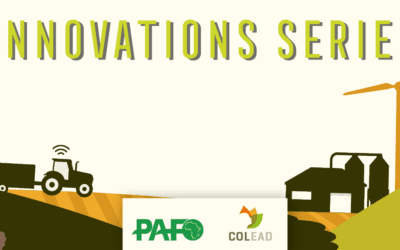Innovations Session n°19 (19 June 2024) presents online agrifood marketplaces developed and used by African entrepreneurs and smallholders
Innovations Session N°1
The private sector and innovative businesses are key to the future of food systems
Despite numerous challenges, smallholder farmers and small and medium enterprises (SMEs) have unprecedented opportunities to supply local, regional and export markets. Innovation is a driving force in transforming food systems, promoting sustainable agriculture and leveraging investment.
The private sector has a key role to play in shaping more sustainable, inclusive and profitable food systems, driven by innovation, knowledge co-creation, and support for a green transition. In the context of implementation of the African Continental Free Trade Agreement (AfCFTA), and of booming African markets, many trade opportunities exist and will increase at local, regional and continental levels. These opportunities will have to be captured by the local private sector to increase employment, especially for youth and women. It will be important to identify the drivers of success for farmers and SMEs, which could help others to start or consolidate their businesses.
With this background, and aware of the many challenges in getting existing successful businesses to scale, COLEACP and PAFO collaborate to support farmers’ organisations, cooperatives and SMEs to seize opportunities in new markets and to establish key partnerships to strengthen their competitiveness. PAFO and COLEACP are launching a series of sessions on Innovations and successes of African farmer-led businesses and SMEs which will share best practices from entrepreneurs, farmers and agripreneurs across the world, with a focus on innovations in production methods, markets development, digital solutions, technologies and circular economy. They will also feature views on the supporting policy, research, finance and investment environment.
PAFO and COLEACP will hold a series of 2-hour sessions, every 2 months, aiming to:
- Increase awareness and use of existing innovations, led by farmers’ organisations and SMEs across value chains
- Highlight forthcoming innovative technologies and practices with potential for farmers’ organisations and SMEs
- Exchange best practices and successes across regions in the continent and with the EU
- Provide tailored support services (training, technical assistance, extension services, access to finance and documented case studies).
This first session will focus on successes and innovations that supply added-value and develop more sophisticated products for local and regional markets.
Key points for discussion
- What are the key drivers to capture more added-value for African businesses: technology, finance, know-how, business relations? Has Covid-19 accelerated adoption of innovations?
- Value-addition and branding are key in very competitive markets. What skills do development entrepreneurs need to acquire and upgrade to reach more sophisticated high-value markets?
- What are the most urgent areas in value-addition and processing which need policy-makers and investors attention and action to support entrepreneurship and employment in Africa?
- Do the entrepreneurs see opportunities in the implementation of the AfCFTA to expand processing facilities and trade within the continent?
Session Categories
Networking
Join our Agrinnovators community forum to discuss and explore how to encourage innovations across agricultural value chains to transform food systems in Africa, promote sustainable agriculture, and leverage investment. Share insights, ask questions, and collaborate on innovative solutions for a greener future
Recent Innovations Sessions
Innovations Session N°18
Innovations in packaging: opportunities for African entrepreneurs and SMEs A session organised by the PAFO and COLEAD
Innovations Session N°17
The session discusses the potential of African regional markets. The session highlights successes from SMEs and Smallholders.














0 Comments